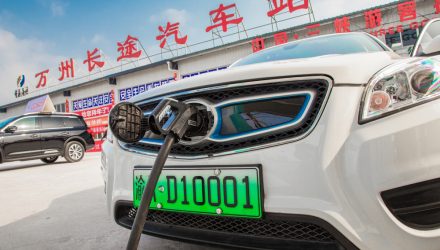China is an infrastructure titan. The country devotes trillions of dollars to expanding and shoring up the country’s energy and transportation systems.
That dedication is carrying over to electric vehicle (EV) infrastructure. The theme applies to more than just China itself. Chinese EV manufacturers and other companies are expanding charge infrastructure across Central Asia. That effort could pay long-term dividends for some of the companies residing in the KraneShares Electric Vehicles and Future Mobility ETF (KARS).
The thesis is simple. And it’s one that arguably should occur in the U.S. Chinese industrial companies and others are helping expand EV charging infrastructure in countries such as Kazakhstan, Kyrgyzstan, and Uzbekistan. So more vibrant end markets for Chinese-made EVs could open. That could translate to top-line growth for KARS holdings.
EV Infrastructure Catalyst for KARS
One of the primary stumbling blocks to broader EV adoption is concern among automobile buyers that the charging infrastructure isn’t robust enough to encourage consumers to move away from internal combustion engines.
It’s easy for EV owners to charge their cars at home. But with batteries still limited, those drivers are apprehensive about taking long trips in their EVs. Some are even pensive about taking relatively short road trips amid fears of a lack of charging stations. China is wise to that fact and is looking eliminate the issue in the Central Asia region. That effort could carry with it positive implications for KARS.
“In Uzbekistan, Chinese executives are seeking to tighten their grip on the electric vehicle market. The Chinese firm Henan Suda signed a deal earlier in December with Uzbekistan’s Energy Ministry to build upwards of 50,000 electric vehicle charging stations around the country by 2033. Already in 2024, 2,500 charging stations are to be constructed,” reported eurasianet.
Alone, that project could serve 700,000 EVs. While Uzbekistan may be overlooked by many U.S. investors, it cannot be ignored that Chinese EV makers, including KARS member firms, exported 200,000 cars there through the end of October.
The importance of charging infrastructure as a catalyst for EV adoption cannot be understated. Specific to China, BYD’s expansive charging network is viewed as one reason that company will soon surpass Tesla (TSLA) as the world’s biggest seller of EVs. Both stocks are top 10 holdings in KARS. They combine for 7.36% of the ETF’s roster.
For more news, information, and analysis, visit the Climate Insights Channel.

